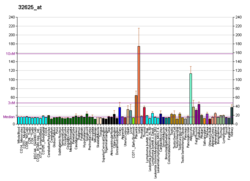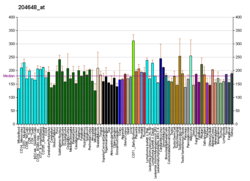NPR1
Appearance
Natriuretic peptide receptor A/guanylate cyclase A (atrionatriuretic peptide receptor A), also known as NPR1, is an atrial natriuretic peptide receptor. In humans it is encoded by the NPR1 gene.
Function
[edit]NPR1 is a membrane-bound guanylate cyclase that serves as the receptor for both atrial and brain natriuretic peptides (ANP and BNP, respectively).[5]
It is localized in the kidney[6] where it results in natriuresis upon binding to natriuretic peptides. However, it is found in even greater quantity in the lungs and adipocytes.[6]
See also
[edit]References
[edit]- ^ a b c GRCh38: Ensembl release 89: ENSG00000169418 – Ensembl, May 2017
- ^ a b c GRCm38: Ensembl release 89: ENSMUSG00000027931 – Ensembl, May 2017
- ^ "Human PubMed Reference:". National Center for Biotechnology Information, U.S. National Library of Medicine.
- ^ "Mouse PubMed Reference:". National Center for Biotechnology Information, U.S. National Library of Medicine.
- ^ "Entrez Gene: NPR1 natriuretic peptide receptor A/guanylate cyclase A (atrionatriuretic peptide receptor A)".
- ^ a b BioGPS > NPR1 Retrieved Nov 2010 Archived November 27, 2010, at the Wayback Machine
Further reading
[edit]- Pandey KN (2002). "Intracellular trafficking and metabolic turnover of ligand-bound guanylyl cyclase/atrial natriuretic peptide receptor-A into subcellular compartments". Mol. Cell. Biochem. 230 (1–2): 61–72. doi:10.1023/A:1014240006767. PMID 11952097. S2CID 10397726.
- Lucarelli K, Iacoviello M, Dessì-Fulgheri P, et al. (2003). "[Natriuretic peptides and essential arterial hypertension]". Italian Heart Journal Supplement. 3 (11): 1085–91. PMID 12506509.
- Pandey KN (2005). "Internalization and trafficking of guanylyl cyclase/natriuretic peptide receptor-A". Peptides. 26 (6): 985–1000. doi:10.1016/j.peptides.2004.12.020. PMID 15911067. S2CID 34452043.
- Garg R, Pandey KN (2005). "Regulation of guanylyl cyclase/natriuretic peptide receptor-A gene expression". Peptides. 26 (6): 1009–23. doi:10.1016/j.peptides.2004.09.022. PMID 15911069. S2CID 33508201.
External links
[edit]- NPR1+protein,+human at the U.S. National Library of Medicine Medical Subject Headings (MeSH)
This article incorporates text from the United States National Library of Medicine, which is in the public domain.






